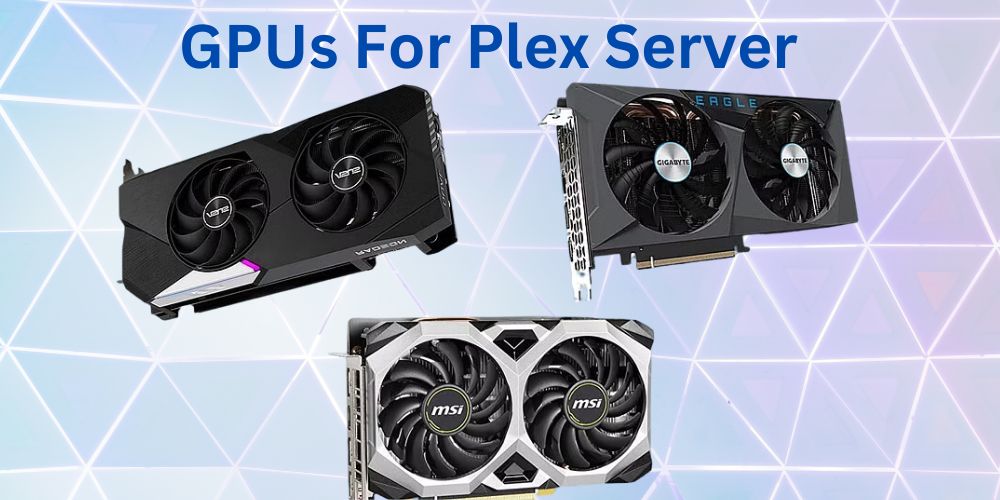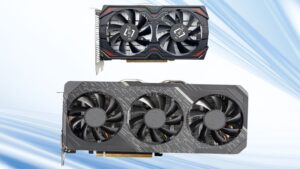The 6 Best GPU for Your Plex Server: A Comprehensive Guide
In the realm of media streaming and content management, Plex has emerged as a popular choice for organizing and accessing multimedia libraries. While the central processing unit (CPU) shoulders the primary workload in a Plex server, the graphics processing unit (GPU) can play a crucial role in optimizing performance, particularly in tasks like hardware transcoding. By offloading transcoding duties to a capable GPU, users can enjoy smoother playback, reduced CPU strain, and enhanced efficiency in handling diverse media formats. This comprehensive guide delves into the world of the best GPU for PLEX servers, focusing on their significance in enhancing Plex server functionality.
We will explore a range of GPUs, from budget-friendly options to high-end powerhouses, considering factors such as hardware transcoding support, power consumption, and performance benchmarks. Whether you are a novice looking to build your first Plex server or a seasoned enthusiast seeking to upgrade your setup, understanding the impact of GPUs on Plex server performance is essential for creating a seamless and immersive media streaming experience.
Understanding Hardware Transcoding:
Before we dive into the best GPUs for Plex, it’s essential to understand the concept of hardware transcoding. Transcoding is the process of converting video files from one format to another, which is often necessary for smooth playback on various devices. While modern CPUs can handle transcoding, they can be power-hungry and may not be able to keep up with the demands of high-definition or 4K video. This is where hardware transcoding comes in, leveraging the processing power of a GPU to offload the transcoding task from the CPU.
Also Read.
Top 6 GPUs for Plex Server:
Now, let’s take a closer look at the top 6 GPUs that are well-suited for your Plex server needs:
1. Gigabyte GeForce GTX 1050 Ti OC
- Transcoding Power: Good
- VRAM: 4GB GDDR5
- Power Efficiency: Excellent
- Compatibility: Windows and Linux

The Gigabyte GeForce GTX 1050 Ti OC is the Best GPU for Plex Server and a budget-friendly graphics card that offers reliable performance for various computing tasks, making it a suitable choice for casual gamers and multimedia enthusiasts. With 4GB of GDDR5 VRAM, it easily handles HD content playback and light gaming, providing smooth visuals and responsive gameplay for popular titles.
One of its notable strengths is its excellent power efficiency. The card draws power exclusively from the PCIe slot, eliminating the need for additional connectors. This feature not only reduces energy consumption but also keeps heat generation in check, contributing to a cooler and quieter system. Additionally, the GTX 1050 Ti OC boasts compatibility with both Windows and Linux operating systems, ensuring a wide range of users can integrate it seamlessly into their setups. Whether you want to upgrade an older system or build a compact Home Theater PC (HTPC), this GPU’s compact design ensures compatibility with various case sizes.
Pros
- Power-efficient and compact design.
- Good for HTPC setups.
- No additional power connectors are required.
Cons
- Limited for modern AAA gaming.
2. EVGA GeForce GTX 1070 Ti Best GPUs for Plex Server
- Transcoding Power: Outstanding
- VRAM: 8GB GDDR5
- Power Efficiency: Excellent
- Compatibility: Windows and Linux

The EVGA GeForce GTX 1070 Ti FTW is a powerhouse graphics card renowned for its exceptional transcoding capabilities. Equipped with 8GB of GDDR5 VRAM, this GPU can effortlessly handle demanding media tasks, making it an ideal choice for Plex servers and content creators.
One of its standout features is its outstanding power efficiency, ensuring that it runs efficiently without generating excessive heat or consuming excessive power. This makes it suitable for 24/7 operation, a crucial requirement for Plex servers that need to be constantly available. Moreover, the card boasts compatibility with both Windows and Linux operating systems, providing flexibility for users of different platforms. This compatibility ensures that you can integrate the EVGA GeForce GTX 1070 Ti FTW seamlessly into a wide range of server setups and one of the Best GPUs for Plex Server.
Pros
- Ample 8GB GDDR5 VRAM.
- Outstanding power efficiency.
- Compatibility with Windows and Linux.
Cons
- May be overkill for basic tasks.
3. ASUS Dual NVIDIA GeForce RTX 3050
- Transcoding Power: Very Good
- VRAM: 4GB/8GB GDDR6
- Power Efficiency: Excellent
- Compatibility: Windows and Linux

The ASUS Dual NVIDIA GeForce RTX 3050 is considered the Best GPU for Plex Server and a mid-range graphics card designed to offer a balanced blend of gaming and media server capabilities. With its “Very Good” transcoding power, it can efficiently handle media tasks, making it suitable for Plex servers and content creation. One standout feature is the availability of two variants, offering either 4GB or 8GB of GDDR6 VRAM. This flexibility allows users to choose based on their specific needs, whether it’s casual gaming or handling larger media libraries. The card’s excellent power efficiency is worth noting, ensuring that it operates efficiently while minimizing power consumption and heat generation. This is especially beneficial for systems running 24/7, such as Plex servers.
Moreover, the RTX 3050 is compatible with both Windows and Linux operating systems, providing versatility for users on different platforms. This compatibility ensures a smooth integration into various server setups, making it a dependable choice for those seeking a balance between gaming and media server performance.
Pros
- Balanced gaming and media capabilities.
- 4GB/8GB VRAM options.
- Excellent power efficiency.
Cons
- May struggle with demanding 4K content.
4. Gigabyte ASUS AMD Radeon: Best GPU for Plex Server
- Transcoding Power: Good
- VRAM: 4GB/8GB GDDR6
- Power Efficiency: Very Good
- Compatibility: Windows and Linux

Another Best GPU for Plex Server is the Gigabyte ASUS AMD Radeon RX 5500XT which is a capable mid-range graphics card known for its versatility. With “Good” transcoding power, it efficiently handles media tasks, making it a suitable choice for Plex servers and multimedia enthusiasts.
One of its key strengths is the availability of two VRAM options: 4GB and 8GB of GDDR6. This flexibility allows users to tailor their GPU choice based on their specific needs, whether it’s gaming or handling media libraries. The card also excels in power efficiency, contributing to lower energy consumption and reduced heat generation. This attribute is especially valuable for systems that run continuously, such as Plex servers. Additionally, the RX 5500XT is compatible with both Windows and Linux operating systems, ensuring it can seamlessly integrate into various system configurations.
Pros
- Versatile VRAM options (4GB/8GB).
- Excellent power efficiency.
- Solid mid-range gaming performance.
Cons
- Not ideal for high-end tasks.
5. ZOTAC Gaming GeForce GTX 1660 Super
- Transcoding Power: Excellent
- VRAM: 6GB GDDR5
- Power Efficiency: Very Good
- Compatibility: Windows and Linux

The ZOTAC Gaming GeForce GTX 1660 Super is the solid best GPU for a Plex server, offering efficient hardware transcoding capabilities and reliable performance. With its NVIDIA Turing architecture, this GPU is well-suited for handling transcoding tasks and ensuring smooth playback of media content on multiple devices. The Super Compact Design and IceStorm 2.0 Cooling system contribute to its efficiency and reliability, making it a practical option for a Plex server setup.
Additionally, the 6GB GDDR6 memory and 192-bit memory interface provide ample resources for transcoding high-definition content, including 4K streams. While the GTX 1660 Super may not be the most powerful GPU available, it strikes a good balance between performance and affordability, making it a cost-effective solution for users looking to enhance their Plex server without breaking the bank. Overall, the ZOTAC Gaming GeForce GTX 1660 Super is a reliable and efficient GPU choice for Plex servers, especially for those aiming to simultaneously handle 4K streams and multiple transcoding tasks.
Pros
- Excellent transcoding power.
- 6GB GDDR5 VRAM for smooth performance.
- Very good power efficiency.
Cons
- Lacks ray tracing capabilities.
6. NVIDIA Quadro P2200: Best GPUs for Plex Server
- Transcoding Power: Outstanding
- VRAM: 5GB GDDR5
- Power Efficiency: Excellent
- Compatibility: Windows and Linux

The NVIDIA Quadro P2200 is a professional-grade graphics card renowned for its exceptional performance and versatility in the Best GPUs for Plex Server. With “Outstanding” transcoding power, it excels in handling media tasks, making it an excellent choice for demanding content creation, 3D modelling, and Plex servers.
Equipped with 5GB of GDDR5 VRAM, this GPU ensures efficient multitasking and smooth performance, even with complex projects and high-resolution media files. One of its standout features is its excellent power efficiency, a crucial consideration for professional workstations that require reliability and stability during prolonged usage. Moreover, the Quadro P2200 is compatible with both Windows and Linux operating systems, offering flexibility for various software and workflow preferences.
Pros
- Outstanding transcoding performance.
- 5GB GDDR5 VRAM for complex tasks.
- Excellent power efficiency for reliability.
Cons
- May be overkill for standard office tasks.
Factors to Consider When Choosing the Best GPUs for Plex Server:
When selecting a graphics processing unit (GPU) for a Plex server, several key factors should be considered to ensure optimal performance, efficiency, and compatibility. Here are the essential factors to consider:
1. Hardware Transcoding Capabilities:
- Look for GPUs that support hardware acceleration technologies such as NVIDIA’s NVENC or AMD’s VCE. These technologies offload the transcoding workload from the CPU to the GPU, resulting in faster and more efficient transcoding.
2. Number of Transcoding Streams:
- Consider the number of simultaneous transcodes you anticipate on your Plex media server. Different GPUs have varying capabilities in terms of the number of streams they can handle simultaneously.
3. Compatibility:
- Ensure that the GPU you choose is compatible with your Plex server setup. Check for driver compatibility with your operating system and Plex media server software.
4. Power Consumption:
- GPUs can consume a significant amount of power, so it’s important to consider the power requirements and ensure that your power supply can handle the additional load.
5. Price and Value:
- Evaluate the cost-effectiveness of the GPU in terms of its transcoding performance and overall features. Consider your budget and desired performance level.
6. Resolution and Quality of Streams:
- The resolution and quality of the streams you plan to serve also play a crucial role in determining the required GPU power. For example, if you plan to stream high-definition or 4K content, you may need a more powerful GPU.
7. Multi-GPU Support:
- If you require multiple GPUs for transcoding, ensure that your system and Plex server are compatible with multi-GPU setups. However, keep in mind the additional power consumption and heat generation from multiple GPUs
Budget-Friendly Options:
Not everyone needs or can afford a top-of-the-line GPU. For those on a budget, there are still plenty of options available. For instance, the Zotac Gaming GeForce RTX 4060 offers a balance of performance and affordability, making it an excellent choice for those who want a capable GPU without breaking the bank. Similarly, AMD’s Radeon RX 7900 XTX is a powerful GPU that can handle transcoding tasks with ease, all while being more budget-friendly than NVIDIA’s high-end offerings.
Recommendations:
- For those who prioritize power efficiency and have a Plex Pass subscription, an Intel CPU with QuickSync is an excellent choice.
- For those who require advanced features and are willing to invest in a high-end system, the NVIDIA GeForce RTX 4090 is a top-of-the-line option.
- For those on a budget, the Zotac Gaming GeForce RTX 4060 or AMD’s Radeon RX 7900 XTX offer a balance of performance and affordability.
Conclusion
When determining the optimal best GPU for a Plex server, prioritize factors like transcoding efficiency, power consumption, and budget. Look for GPUs with robust hardware acceleration capabilities to handle transcoding tasks efficiently, ensuring smooth playback across multiple streams. Consider the server’s size and expected workload; smaller setups may suffice with mid-range GPUs, while larger installations or 4K transcoding demand higher-end models. Strike a balance between transcoding performance and power efficiency to minimize operational costs and environmental impact. Additionally, factor in compatibility with your server hardware and software ecosystem. Ultimately, choose a GPU that meets your specific requirements, offering reliable performance within your budget constraints.
Frequently Asked Questions
Q1: What role does a GPU play in a Plex server?
- A GPU in a Plex server primarily handles transcoding, converting media files into various formats and resolutions for seamless playback across different devices. GPUs with hardware acceleration capabilities significantly improve transcoding efficiency, allowing the server to handle multiple streams simultaneously.
Q2: Do I need a dedicated GPU for my Plex server?
- While a dedicated GPU isn’t strictly necessary, it greatly enhances the server’s transcoding performance, especially when dealing with high-resolution or multiple concurrent streams. For small-scale setups or less demanding usage, integrated graphics may suffice, but for smoother operation and improved efficiency, a dedicated GPU is recommended.
Q3: What factors should I consider when choosing a GPU for my Plex server?
- Key factors include transcoding capability, power efficiency, compatibility with your server hardware and software, and budget. Assessing your expected workload and the number of simultaneous streams will help determine the appropriate GPU performance level needed for your setup.
Q4: Are there specific GPUs recommended for Plex servers?
- While specific recommendations can vary based on individual needs and preferences, GPUs with robust hardware acceleration, such as certain models from Nvidia’s GeForce GTX and RTX series or AMD’s Radeon RX lineup, are commonly favoured for Plex servers due to their efficient transcoding capabilities.
Q5: Can I use gaming GPUs for my Plex server?
- Yes, gaming GPUs can be utilized for Plex servers, especially if they offer efficient hardware transcoding capabilities. However, ensure compatibility with your server’s hardware and consider factors like power consumption and noise levels, as gaming GPUs may prioritize performance over energy efficiency and quiet operation.
Last Updated on 22 January 2025 by Ansa Imran

Ansa Imran, a writer, excels in creating insightful content about technology and gaming. Her articles, known for their clarity and depth, help demystify complex tech topics for a broad audience. Ansa’s work showcases her passion for the latest tech trends and her ability to engage readers with informative, well-researched pieces.







